|
restoring our biblical and constitutional foundations
|
Taking Care of Each Other
(Ethiopia, December 2006 - January 2007, Part 4b)
Two evangelists we fell in love with are named
Melese. To keep them separate we call one by his nickname “Melli.” Melli
is married and has 2 small sons. Their home consists of 2 rooms, a cement
floor, mud walls, and tin roof. It is situated in a compound with 2 other
such homes, a community
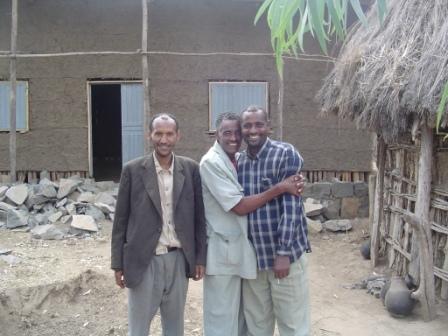 “shintabet”
(toilet hole), and a community kitchen (with wood fire). Melli and his
wife sleep on a bed, but the boys sleep on the floor. Their bedroom also
serves as living room and dining room.
“shintabet”
(toilet hole), and a community kitchen (with wood fire). Melli and his
wife sleep on a bed, but the boys sleep on the floor. Their bedroom also
serves as living room and dining room.
Melli (middle man in the picture) is 38 years old. He is from a large town far from Alaba. He was raised in the Orthodox Church. At about age 20, while very sick in a hospital, he had a vision from Jesus, and he became one of His followers. His family disowned him and for 2 years he lived in the church. This was during the Derg military (communist) rule of Ethiopia. Most churches were closed by the government during this time, but the Durami church remained open.
He came to Alaba as an evangelist 7 years ago. He has attended the Bible School in Alaba. One of his favorite passages in the Bible, which he wants to relay to his American brethren, is from Psalm 91:
It is a good thing to give thanks unto the Lord,
And to sing praises unto thy name, O most High.
To shew forth thy lovingkindness in the morning,
And thy faithfulness every night.
I asked him to give me just two examples of the
faithful care he has seen from the Lord Jesus. One day
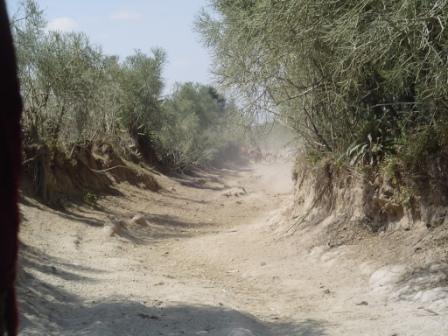 he
was riding his bicycle traveling to a rural village. He noticed a group of
Muslim men chasing him. He rode faster and faster. The ground was uneven
and his bike wheel hit a stone. The bike overturned and he was thrown. “I
was out of my head for over an hour,” he said. “When I awoke, I was
surrounded by little village children. I don’t know what happened to the
men chasing me. But God somehow protected me.”
he
was riding his bicycle traveling to a rural village. He noticed a group of
Muslim men chasing him. He rode faster and faster. The ground was uneven
and his bike wheel hit a stone. The bike overturned and he was thrown. “I
was out of my head for over an hour,” he said. “When I awoke, I was
surrounded by little village children. I don’t know what happened to the
men chasing me. But God somehow protected me.”
Another time he was walking between villages on the
main road; again a group of aggressive Muslim men were pursuing him. They
planned to catch up to him and block him in between them, “guiding” him
off the road so
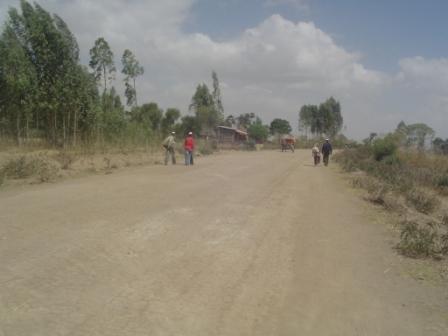 they
could do him harm. He was trying to go faster and faster, but they were
catching up.
they
could do him harm. He was trying to go faster and faster, but they were
catching up.
They were obviously well-built, healthy men; Melli is
very thin and of delicate health. (And it’s likely he hadn’t eaten all
day.) In his words, “Just as I reached the bridge over the river, the men
caught up with me. But do you know how the Lord protected me? Just at that
time, a group of Christian believers arrived at the bridge from the other
side, and also a truck load of UN soldiers and a truck load of Ethiopian
soldiers arrived from opposite directions. The trucks stopped to visit
with each
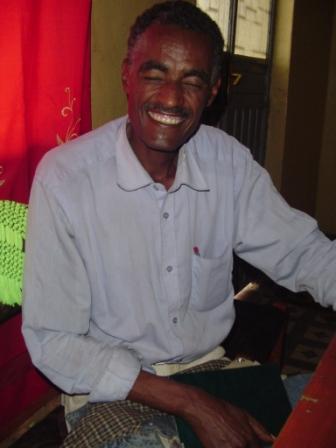 other,
and I visited with my Christian brethren. The bridge came alive with all
this fellowship! So this band of evil-doers that had been chasing me was
undone by the perfect arrangement of our Lord.”
other,
and I visited with my Christian brethren. The bridge came alive with all
this fellowship! So this band of evil-doers that had been chasing me was
undone by the perfect arrangement of our Lord.”
The health of Melli is of concern to me. He is very skinny, and he has stomach trouble; I think he’s already had ulcer surgery. We’re giving him protein bars with vitamins, but will you join us in prayer for his continued protection and physical strength?
The last evangelist I’d like to introduce is also
named Melese. He is married and has 8 children, 6 of whom are still at
home. He and his family live in the last house before the river. The
hyenas pass his home every night as they come into the town to scavenge.
Like Melli’s, his home has 2 rooms, cement floor, mud
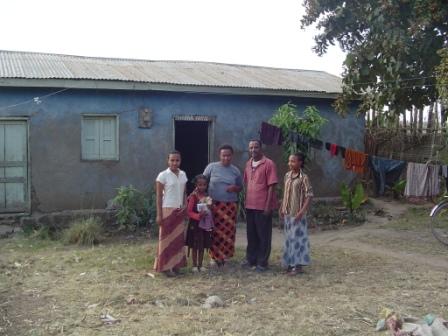 walls,
wooden windows, and a separate hole toilet house and kitchen. There is
one other family living in his compound.
walls,
wooden windows, and a separate hole toilet house and kitchen. There is
one other family living in his compound.
I met Melese’s wife when she came to me with a swollen knee. It had been swollen for about 6 months, and she could barely walk. With God’s help, over the course of 2 weeks, she was much improved through medication I had with me. We got her a toilet seat (so that she doesn’t have to squat) and I gave her strict instructions about using her knee. Unfortunately, life for an Ethiopian woman is very hard on the body (see photos below) and, being the wife of an evangelist, there isn’t money for nice things like work tables. Ethiopian women do their cooking at ground level. Please pray for Tigist, that she will learn to live with the arthritis God has chosen to give her.
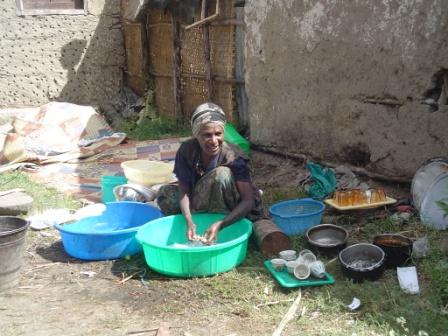
Washing dishes.
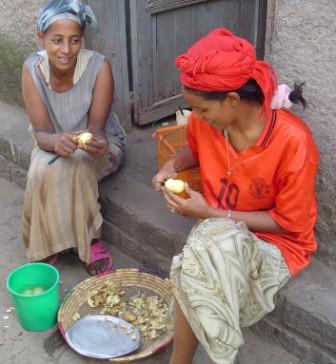
Peeling potatoes.
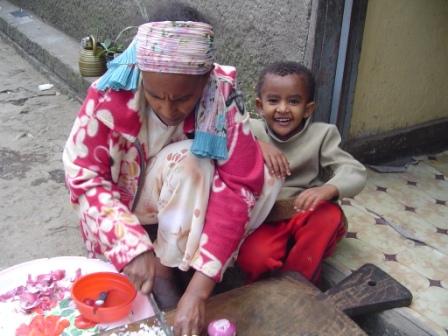
Chopping onions.
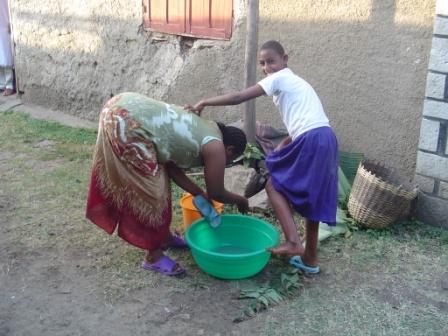
Bathing children.
Melese has suffered much because of the Gospel. He doesn’t brag about it; in fact, he tells the stories with hesitation (there is something almost sacred in these stories of God’s personal faithfulness). One such story is the night of the last birth in his family. The births of all his children had been difficult. When the last one was due to be born, their family was living in a row of rooms. To one side was a Muslim family and to the other side was an Orthodox family; they were hated by both. (His wife had already been beaten by neighboring Muslims while he was away.) Melese was anxious that his wife’s childbirth could disturb the people next door and inflame antagonism. There was no place to pray in private; so he went to the shintabet (toilet house) to pray. Here, in the “lowest part of the earth,” he pleaded with God to ease his wife’s discomfort and help them. As he lifted himself up from the earth, God spoke to him. “I will provide for you,” He said.
In faith Melese returned to his home and cleaned a razor blade (to cut the birth cord). He gathered his family in a circle, they held hands, and in unison they called “Jesus!” “Jesus!”, “Jesus!” Between the second and third “Jesus” his wife gave a push and out popped a beautiful little daughter – no pain, no strain, no difficulty. The complete birthing took only half an hour! Do you know what they named that little girl? “Salam,” which means “Peace.”
I’ve met Salam; she has a peaceful spirit about her that is truly rare. Today she’s about 8 years old, and already she is full of the power of prayer. Melese told me that when she was 4 years old she wanted to pray at their family devotions; he kept asking the oldest daughter to pray, but finally he consented and allowed Salam to pray. As she opened her mouth to speak, the whole room was filled with a heavenly light. When we came back from a village I was sporting an arm swollen and discolored from (spider?) bites. The leaders were anxious about it; even I was cautious about it. But on the third day the bites were almost gone; that was the morning that Salam came to our room and immediately checked my arm. She had been praying, and I have no doubt that our Lord was hearing her sweet voice. She was born in faith, and she is living in faith, the faith of our Lord Jesus, the Name called at her birth.
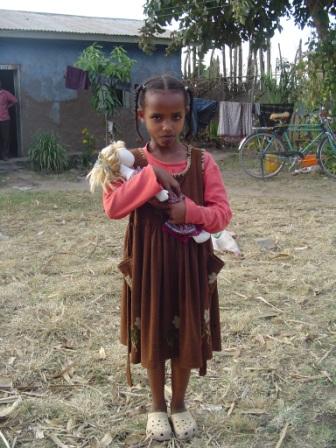
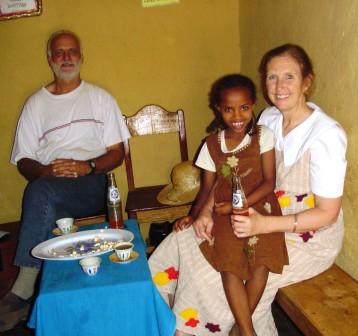
Salam with a dolly given to her by a girl in Virginia. Sharing a snack in Salam's home.
One burden the Alaba Town leaders shared with us is the financial support of their evangelists. We asked for details. Most of the leaders are either public school teachers or small business owners. Their income is about 1500-1600 Ethiopian birr a month. The range of income for the evangelists is only 300-700 birr a month! It is completely impossible for these evangelists to support their families on such low income. As a result, they are suffering chronic malnutrition, persistent illness, etc. And these evangelists bear an extra burden. They are nose-to-nose with needy people in their ministry. How can they just pray and walk away? So their small incomes not only need to cover their families, but also those spontaneous situations that develop in the normal course of their ministries. (Note: unlike most American homes, these are single-income families.)
The Lord has burdened us with this need. So we are asking the Lord’s servants in America to consider giving to a special Evangelists Fund. These monies will be given to the church to augment the evangelists’ meager salaries. It will focus on those evangelists most in need. Sometimes people here have asked us if they can “sponsor” an evangelist. We are skittish about this personal approach, because the Evil One uses it to divide evangelists between “sponsored ones” and “unsponsored ones”; pride dances with the sponsored group and depression and discouragement haunts the unsponsored group. We have discussed this with the church leaders and we all feel that the best thing is to collect funds designated for evangelist living needs (including clothing, food, medical and children’s school expenses). These funds will be distributed irregularly (as the income is received), and disproportionately (as the various evangelists have needs).
So will you pray about this situation and ask our Lord if He wants you to share this burden of relief? If He directs you to help with this need, please be sure to note “For Evangelists” on your check. We promise you that every cent will be given directly to the Ethiopian church; we do not deduct “administrative fees.” And every cent will be used by the Ethiopian church for the needs of the evangelists.
Your Brothers in Christ. The Alaba Evangelists.
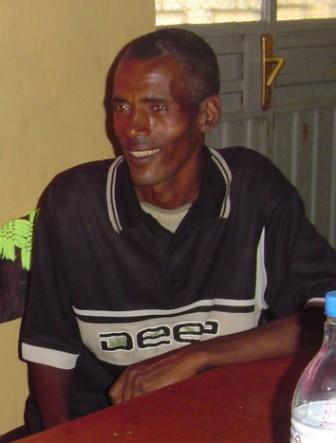
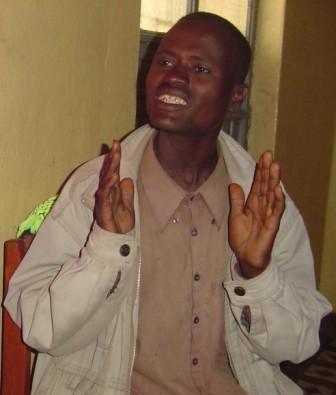
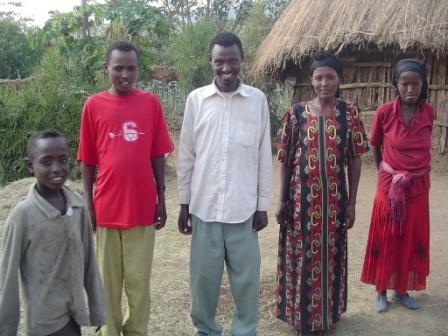
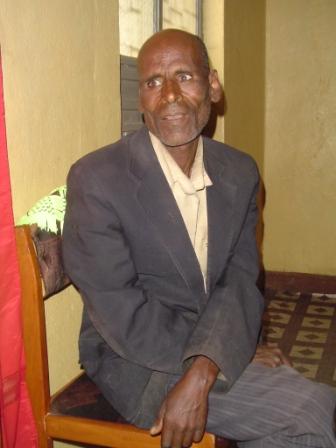
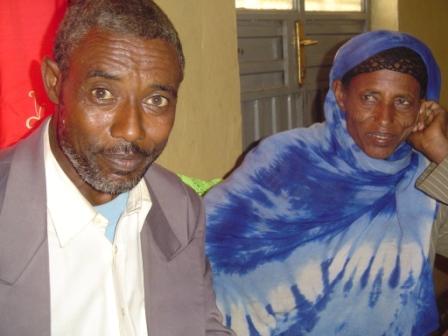
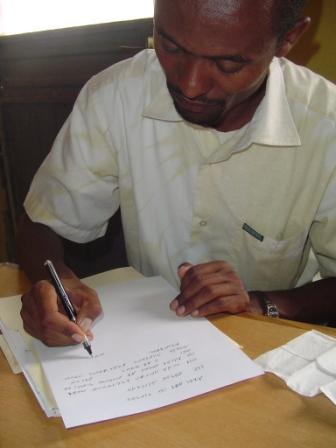
Coming up next: Our Goals for 2007.
February 13, 2007